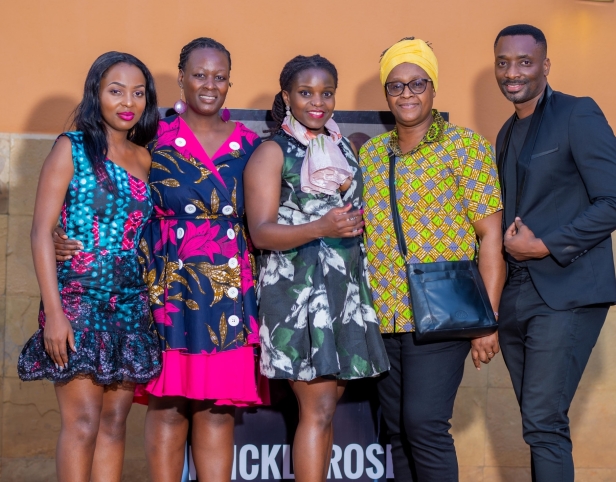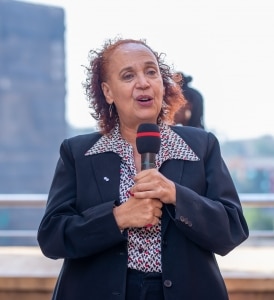
Valentine’s came early at Akina Mama wa Afrika as people from different walks of life clad in shades of pink, blue and black, as if on cue to be as colorful as flowers, filled the auditorium at Century Cinemax Acacia in Kampala on 13th February to attend the premiere of Prickly Roses, a film that dramatizes the lives of women working on flower farms in Uganda. The film produced under the auspices of the Women at Work campaign – a drive promoting decent work conditions for women engaged in global horticulture value chains seeks to showcase the experiences of women working on flower farms and their interactions with issues of social protection, minimum wage and sexual harassment. In partnership with Nabwiso Films and Hivos, the premiere aimed at using the creative arts to influence change in policy and practice around issues of concern to women and girls.

While most of the women working on flower farms are hired because of their soft fingers, the lives they all lead are far from soft. They go to work and pick roses and lilies, not necessarily out of desire but necessity. By day, they endure long hours and by night, they rack their brains over the burden of caring for themselves and their families with their little pay. One decent bouquet of flowers in Kampala could foot the monthly salary of one worker on probation. But at the end of the day, the fair share of this money does not end up in their pockets. Prickly Roses is not an easy film to watch as it brings to light the plight of women in the informal sector that the world cannot afford to ignore.



L-R: AMwA’s Board Chairperson Dr. Maggie Kigozi, AMwA’s Research, Advocacy and Movement Building Manager, Leah Eryenyu and Nuriat Nabiwande
It was a watershed moment as the film ignited discourse and actions around improving the conditions of such women. For many, the film triggered sympathy and anger influenced by the pain women on flower farms endure and motivated a clarion call to publicize the film for more and more actors to stand in solidarity with women in the informal sector and advocate for their rights. The film also confirmed the fact that in comparison to men, women are more likely to become and remain unemployed. They have fewer chances to participate in the labour force and when they do, often have to accept lower quality jobs. Women are also typically the first to lose their jobs or accept shorter hours and bad working conditions to keep jobs.
“The ultimate goal is decent work for women. We need to identify the right tools for women to be able to demand their rights. We cannot separate business and human rights and it is therefore important to work with employers in ensuring that employees have a good working environment which is key for high productivity.” – Leah Eryenyu
Participants further raised the urgent need to put the minimum wage discussion back on the country’s agenda in order to deter employers from having the leeway to exploit their workers. In addition, the need for the government to ratify, domestic and implement the ILO Convention on violence and harassment in the world of work was stressed. Also present was Nuriat Nabiwande, a principal labor officer in charge of gender mainstreaming at the Ministry of Labor who confirmed the scenes in the film having visited some of the flower farms herself. She added that most of the employers are not aware or empowered about their rights and have limited knowledge on how to address challenges faced at the workplace and noted that the government lacks adequate resources to do advocacy work.

Watch the official Prickly Roses trailer here: https://youtu.be/TKv2QKZ9Dek

